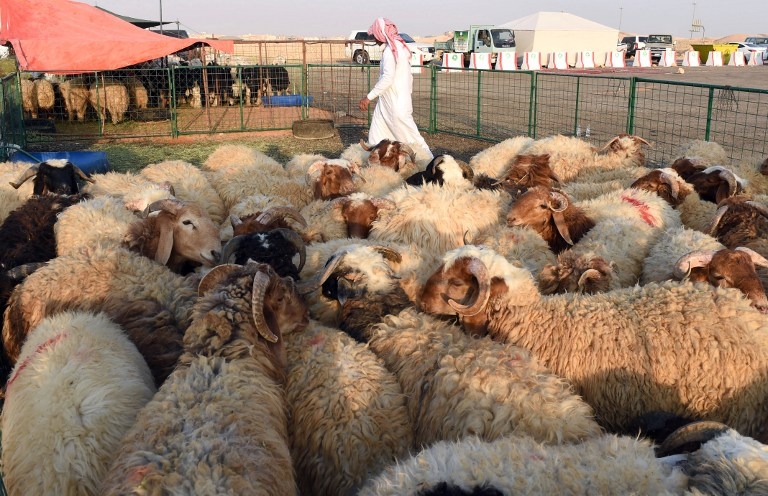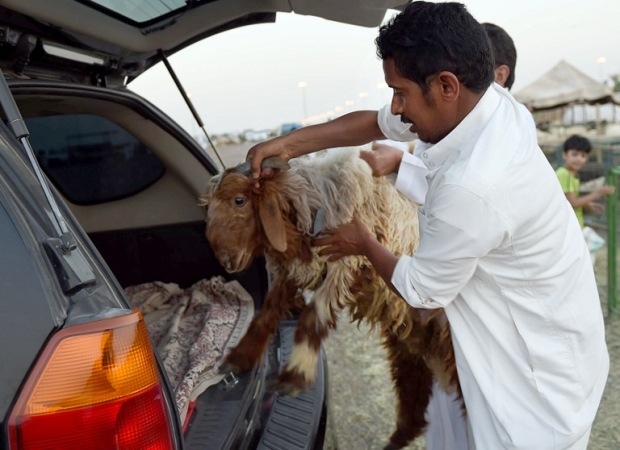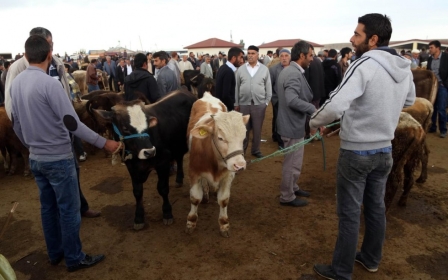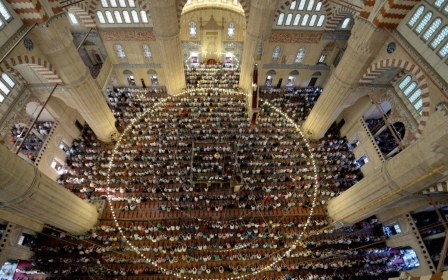Fat sheep, fat price for Saudi Eid festivities

By Ian Timberlake
There is a whiff of sheep dung in the early evening air as the sun drops from sight and Ali al-Shamrani ponders the market for his animals ahead of Saturday's Eid al-Adha festival.
"This year they are more expensive," he says outside a pen of about 40 Saudi Arabian Naimy-variety sheep, most of them with brown heads and thick dirty-white fleece.
"There aren't too many Naimy this year," says the black-bearded trader, who trucked his animals to the Saudi capital Riyadh early this week from Hafar al-Batin in the country's north, near Iraq.
He and several other traders have set up their animal pens - and tents where they themselves rest - in one of 14 temporary market sites established by authorities in the city of 5.7 million before the Muslim feast of sacrifice.
The sacrifice of sheep, goats and other animals for Eid al-Adha is a re-enactment of the story of Abraham, who was prepared to fulfil God's command to sacrifice his own son.
By tradition, one-third of the meat from the sacrifice is for the family, while the rest is evenly divided and given to friends and the poor.
For centuries the ritual slaughter has lured sheep traders to big cities and towns, eager for their biggest sales of the year.
For both the traders and their customers, every festival brings a customary debate over the price of sheep - and this year is no exception.
Syria war hits supply
Shamrani, with sunglasses hanging from the breast pocket of a traditional white thobe, sells his sheep for between 1,600 and 2,000 riyals ($427-$533) - about 10 percent more than last year.
"It's more costly. Not like last year," says Nasser al-Qahtani, a clean-shaven medical student who arrives at the Riyadh market with his best friend, Muath al-Obaida.
They came from their newly-built neighbourhood carved out of the hard desert earth, nearby in northern Riyadh's Al-Yasamin district.
Qahtani - far from thin himself - says he can tell a good sheep by feeling its flesh and fat.
"Fat one better," he says in English, after finding one that felt just right.
Despite this year's higher prices, he and Obaida hand over 1,900 riyals ($506) for the animal, about 400 riyals ($106) more than during the previous Eid.
The rump of the chosen sheep is sprayed with red paint, marking it for their collection later.
"The closer we get to Eid, the more expensive the slaughter animals become," said a resident of Saudi Arabia's north, who gave his name only as Abu Majed.
He will sacrifice just one animal this year, instead of his usual two, "because they are so expensive now".
Traders have blamed the rising prices on a drop in supply.
"Prices in Saudi Arabia remain cheaper than in neighbouring Gulf States. Still, limited local production and increased consumption put pressure on the market," the Arab News quoted Suleiman al-Jabri, of the Chamber of Commerce and Industry in the Red Sea city of Jeddah, as saying.
Efforts were being made to keep prices stable, he said, with more than one million sheep due to arrive in Jeddah from Sudan and Somalia.
"There are fewer sheep than last year," says Asef Nemah, a vendor who just arrived at the Yasamin Eid market with a truckload of the Naimy breed from about 70 kilometres outside the capital.
The smiling Nemah, with hands on his hips and a red-check shemagh wrapped around his head, says sheep are not coming this year from war-torn Syria, which traditionally had been a key supplier.
Obaida says the absence of Syrian animals doesn't bother him - he prefers the taste of Saudi Naimy.
"It's very nice," he says.
New MEE newsletter: Jerusalem Dispatch
Sign up to get the latest insights and analysis on Israel-Palestine, alongside Turkey Unpacked and other MEE newsletters
Middle East Eye delivers independent and unrivalled coverage and analysis of the Middle East, North Africa and beyond. To learn more about republishing this content and the associated fees, please fill out this form. More about MEE can be found here.





